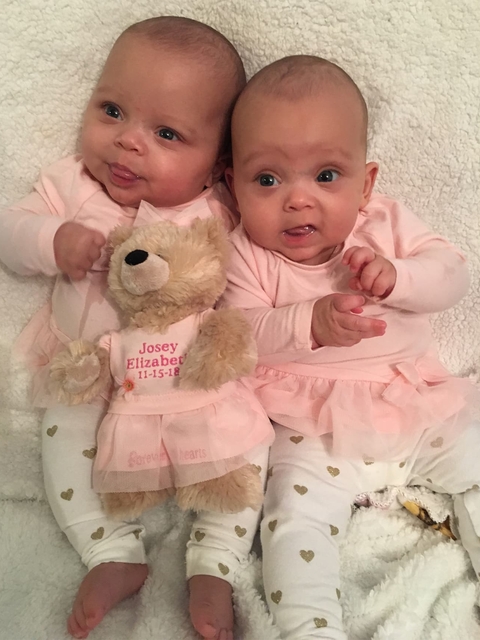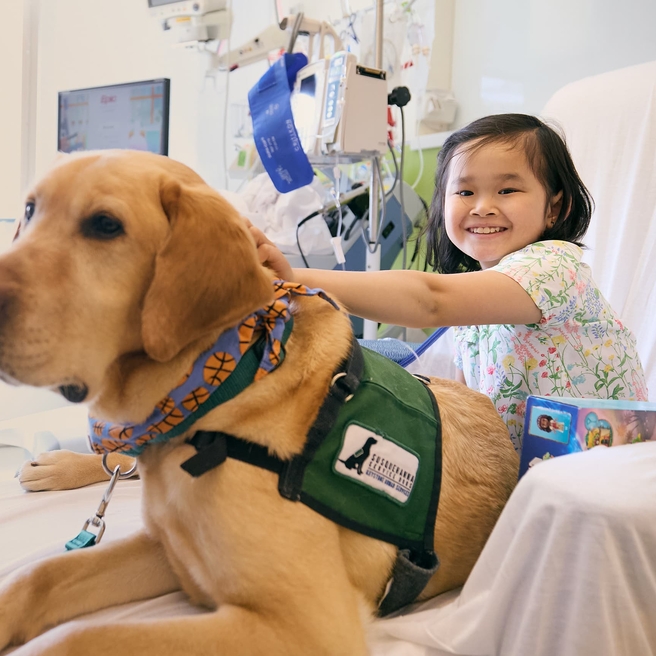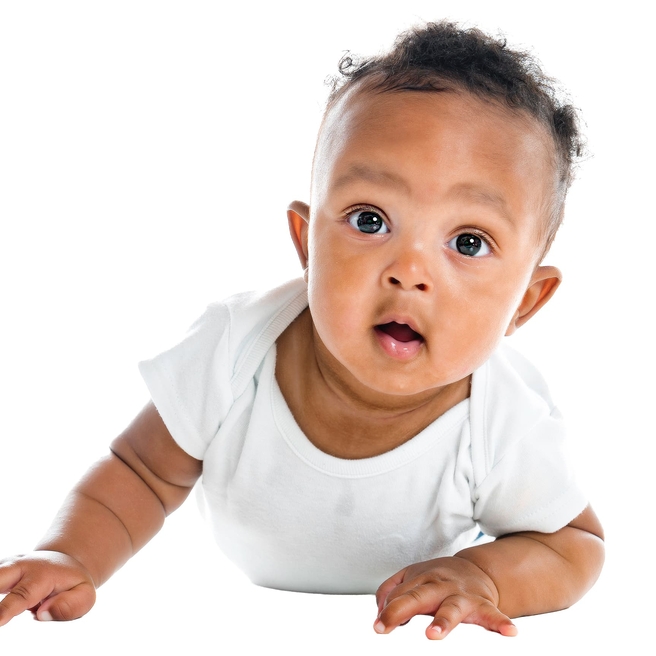

When Madison got pregnant in 2018, she and her husband, Mitch, were thrilled, but the pregnancy had many challenges. Madison was carrying triplets, and tragically one of them, Josie, was lost during the pregnancy due to twin-twin transfusion syndrome. Madison needed to be hospitalized on bed rest for weeks. Fraternal twins Audrey and Emma were born prematurely at 30 weeks old and were cared for in a newborn intensive care unit near the family’s home in Maryland.
While Emma progressed well, Audrey had several concerning episodes of a low heart rate. Then a doctor noticed something unusual: Audrey’s tongue looked larger than normal. “That was the first clue,” says Mitch.
Genetic testing revealed that Audrey had Beckwith-Wiedemann syndrome (BWS), a rare condition that affects only about 1 in 10,340 births. BWS is caused by changes in genes that control body growth. The results can include overgrowth of one side or one part of the body, an enlarged tongue, enlarged organs, and low blood sugar. It also causes an increased risk of developing certain cancers during childhood, usually kidney or liver tumors. Few children have all the characteristics. Some may have only a subtle feature, such as slightly different leg lengths. Due to the wide variety of ways the condition can affect a child, it is now referred to as Beckwith-Wiedemann spectrum.
With so many different areas of the body potentially affected, a child needs to be seen by multiple specialists: an oncologist for cancer screening, an orthopedist for limb issues, a plastic surgeon for an enlarged tongue, an endocrinologist for blood sugar monitoring — and often more.
That was going to be the case for Audrey, Mitch recalls: “We were being referred to a bunch of different specialists in the area.” He and Madison were faced with scheduling a half-dozen or so appointments, all in different locations.
But then Madison’s mother, who had spent three decades as a NICU nurse, made a discovery: There was a doctor nearby who is world-renowned in treating BWS, and she runs a clinic where all the needed specialists are in one place. Excited, Madison and Mitch contacted Jennifer Kalish, MD, PhD, a pediatric geneticist who leads the Beckwith-Wiedemann Syndrome Clinic at Children’s Hospital of Philadelphia.
‘We have the full team’
CHOP’s BWS Clinic had its beginnings more than 15 years ago, when Dr. Kalish — who now holds the Lorenzo “Turtle” Sartini Jr. Endowed Chair in Beckwith-Wiedemann Syndrome Research — saw her first BWS patient.
“We were seeing these patients in the genetics clinic, but I wanted to create a comprehensive experience,” she says. “I started working with other physicians in other disciplines, like plastics, pulmonology and endocrinology.”
With effort and funding, a true multidisciplinary clinic was formed. A core clinical staff sees every patient.
“Then we have the other specialists available,” Dr. Kalish explains.
“Not every patient needs every specialist. But we have the full team.” It is the only truly comprehensive BWS clinic in the world.
Having seen so many patients, the CHOP BWS Clinic team has the most expertise in treating children with the condition. The team has developed guidelines that clinicians anywhere can follow. For example, in 2017 Dr. Kalish’s team led the formalization of tumor-screening guidelines in collaboration with national cancer predisposition experts. Those guidelines were updated this year based on the additional data they have collected.
When children with BWS have an enlarged tongue, they might need tongue-reduction surgery — a technically challenging procedure that CHOP performs. Dr. Kalish collaborated with Jesse Taylor, MD, Chief of the Division of Plastic, Reconstructive and Oral Surgery to create a scoring system that determines whether a child needs the surgery.
“A detailed physical examination coupled with a patient’s degree of symptoms such as breathing difficulty, feeding difficulty and speech differences direct whether to do a tongue reduction,” explains Dr. Taylor. “Very few centers take the analytical approach to these cases that we do. Only after we have done an exhaustive, quantitative workup do we contemplate surgery.”
Dr. Kalish also developed a research registry and biorepository to collect and study clinical data and samples. The data and samples help drive Dr. Kalish’s lab-based research program to understand why the changes that cause BWS lead to the overgrowth of certain organs. They are researching why, for example, some organs develop cancer and some do not.
A tumor removed, a child thriving
Audrey had her first appointment at CHOP in May 2019, five months after she was born.
“What we loved was that everything was connected at CHOP,” says Mitch. At that visit, the family found an advocate: “Dr. Kalish pushed hard to get Audrey in for an ultrasound to screen for cancers,” Mitch says. “This is an important part of the story — Dr. Kalish was so adamant, and we got the ultrasound that day.”
The ultrasound revealed a mass on Audrey’s liver that turned out to be cancerous. The surgery to remove the mass was successful, but Audrey’s little body struggled to recover from the procedure. She needed to be intubated, and she was in the hospital for five weeks.
As Mitch puts it, “Things progressed. It just took a while.” Audrey then underwent two rounds of chemotherapy. “From that point, everything went smoothly.”
Audrey has been followed at CHOP’s BWS Clinic ever since, and she’s thriving. Now 6 years old, she has taken gymnastics classes and swimming lessons, and Mitch laughs that she is “crushing kindergarten.” Despite the enlarged tongue that was the first clue she had BWS, Dr. Taylor determined she didn’t need tongue-reduction surgery. “Her tongue stopped growing and the rest of her kept growing,” Mitch explains. Every year, the number of times she comes to CHOP has decreased, and soon no special monitoring will be needed at all.
“We credit so much of how well Audrey is doing to Dr. Kalish,” says Mitch. “We are so grateful for everything CHOP means to us. It’s hard to put into words.”
To learn how you can support BWS research, contact Alexa Linton at lintona1@chop.edu.
Featured in this article
Experts
Specialties & Programs

When Madison got pregnant in 2018, she and her husband, Mitch, were thrilled, but the pregnancy had many challenges. Madison was carrying triplets, and tragically one of them, Josie, was lost during the pregnancy due to twin-twin transfusion syndrome. Madison needed to be hospitalized on bed rest for weeks. Fraternal twins Audrey and Emma were born prematurely at 30 weeks old and were cared for in a newborn intensive care unit near the family’s home in Maryland.
While Emma progressed well, Audrey had several concerning episodes of a low heart rate. Then a doctor noticed something unusual: Audrey’s tongue looked larger than normal. “That was the first clue,” says Mitch.
Genetic testing revealed that Audrey had Beckwith-Wiedemann syndrome (BWS), a rare condition that affects only about 1 in 10,340 births. BWS is caused by changes in genes that control body growth. The results can include overgrowth of one side or one part of the body, an enlarged tongue, enlarged organs, and low blood sugar. It also causes an increased risk of developing certain cancers during childhood, usually kidney or liver tumors. Few children have all the characteristics. Some may have only a subtle feature, such as slightly different leg lengths. Due to the wide variety of ways the condition can affect a child, it is now referred to as Beckwith-Wiedemann spectrum.
With so many different areas of the body potentially affected, a child needs to be seen by multiple specialists: an oncologist for cancer screening, an orthopedist for limb issues, a plastic surgeon for an enlarged tongue, an endocrinologist for blood sugar monitoring — and often more.
That was going to be the case for Audrey, Mitch recalls: “We were being referred to a bunch of different specialists in the area.” He and Madison were faced with scheduling a half-dozen or so appointments, all in different locations.
But then Madison’s mother, who had spent three decades as a NICU nurse, made a discovery: There was a doctor nearby who is world-renowned in treating BWS, and she runs a clinic where all the needed specialists are in one place. Excited, Madison and Mitch contacted Jennifer Kalish, MD, PhD, a pediatric geneticist who leads the Beckwith-Wiedemann Syndrome Clinic at Children’s Hospital of Philadelphia.
‘We have the full team’
CHOP’s BWS Clinic had its beginnings more than 15 years ago, when Dr. Kalish — who now holds the Lorenzo “Turtle” Sartini Jr. Endowed Chair in Beckwith-Wiedemann Syndrome Research — saw her first BWS patient.
“We were seeing these patients in the genetics clinic, but I wanted to create a comprehensive experience,” she says. “I started working with other physicians in other disciplines, like plastics, pulmonology and endocrinology.”
With effort and funding, a true multidisciplinary clinic was formed. A core clinical staff sees every patient.
“Then we have the other specialists available,” Dr. Kalish explains.
“Not every patient needs every specialist. But we have the full team.” It is the only truly comprehensive BWS clinic in the world.
Having seen so many patients, the CHOP BWS Clinic team has the most expertise in treating children with the condition. The team has developed guidelines that clinicians anywhere can follow. For example, in 2017 Dr. Kalish’s team led the formalization of tumor-screening guidelines in collaboration with national cancer predisposition experts. Those guidelines were updated this year based on the additional data they have collected.
When children with BWS have an enlarged tongue, they might need tongue-reduction surgery — a technically challenging procedure that CHOP performs. Dr. Kalish collaborated with Jesse Taylor, MD, Chief of the Division of Plastic, Reconstructive and Oral Surgery to create a scoring system that determines whether a child needs the surgery.
“A detailed physical examination coupled with a patient’s degree of symptoms such as breathing difficulty, feeding difficulty and speech differences direct whether to do a tongue reduction,” explains Dr. Taylor. “Very few centers take the analytical approach to these cases that we do. Only after we have done an exhaustive, quantitative workup do we contemplate surgery.”
Dr. Kalish also developed a research registry and biorepository to collect and study clinical data and samples. The data and samples help drive Dr. Kalish’s lab-based research program to understand why the changes that cause BWS lead to the overgrowth of certain organs. They are researching why, for example, some organs develop cancer and some do not.
A tumor removed, a child thriving
Audrey had her first appointment at CHOP in May 2019, five months after she was born.
“What we loved was that everything was connected at CHOP,” says Mitch. At that visit, the family found an advocate: “Dr. Kalish pushed hard to get Audrey in for an ultrasound to screen for cancers,” Mitch says. “This is an important part of the story — Dr. Kalish was so adamant, and we got the ultrasound that day.”
The ultrasound revealed a mass on Audrey’s liver that turned out to be cancerous. The surgery to remove the mass was successful, but Audrey’s little body struggled to recover from the procedure. She needed to be intubated, and she was in the hospital for five weeks.
As Mitch puts it, “Things progressed. It just took a while.” Audrey then underwent two rounds of chemotherapy. “From that point, everything went smoothly.”
Audrey has been followed at CHOP’s BWS Clinic ever since, and she’s thriving. Now 6 years old, she has taken gymnastics classes and swimming lessons, and Mitch laughs that she is “crushing kindergarten.” Despite the enlarged tongue that was the first clue she had BWS, Dr. Taylor determined she didn’t need tongue-reduction surgery. “Her tongue stopped growing and the rest of her kept growing,” Mitch explains. Every year, the number of times she comes to CHOP has decreased, and soon no special monitoring will be needed at all.
“We credit so much of how well Audrey is doing to Dr. Kalish,” says Mitch. “We are so grateful for everything CHOP means to us. It’s hard to put into words.”
To learn how you can support BWS research, contact Alexa Linton at lintona1@chop.edu.
Recommended reading
A day in the life of a facility dog

As a specially trained dog, Dilly helps patients cope with stress and can motivate them during therapy.
Drawing from the Community

A unique program at CHOP trains residents of Philadelphia to become phlebotomists. It benefits participants, CHOP and patient families.
Newborns Get New Answers

A program called Baby Eagle spreads its wings by delivering rapid genomic sequencing to critically ill infants at no cost to families.
Contact us
Beckwith-Wiedemann Syndrome and Overgrowth Genetics Clinic